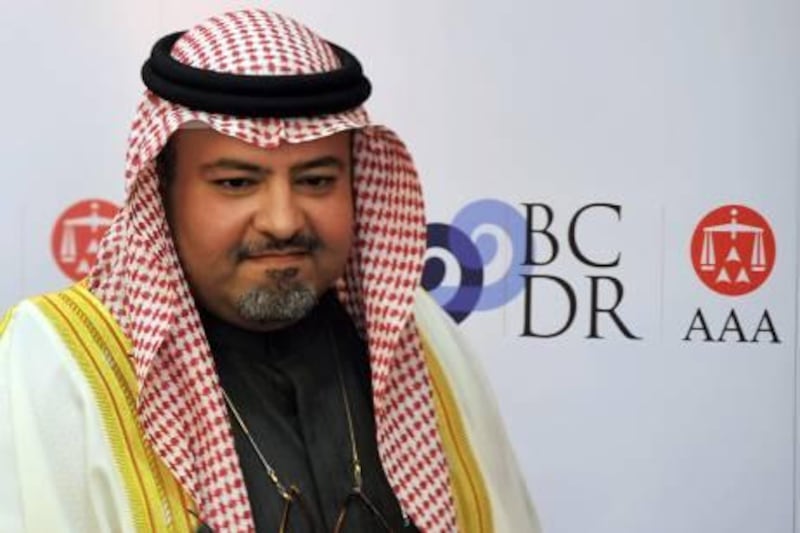MANAMA // Bahrain's minister of justice and Islamic affairs says upcoming parliamentary elections will be free and fair and will reflect the interests of all of the country's people.
"We are not a Sunni government; we are a Bahraini government," Sheikh Khaled bin Ali Al Khalifa said this week. "The people who are saying this are in fact putting us in a hole and saying if you want to get out, dig more, and this is not acceptable by any means."
Sheikh Khaled, who is a member of the Bahraini royal family and heads the committee overseeing the October 23 balloting, told The National in an interview in his office this week that there was no discrimination in the laws guiding elections and government in Bahrain.
"You cannot build a country on specific rights for Sunnis and specific rights for Shias," he said, adding: "I don't have any statistics about who is Sunni, who is Shia", and members of both sects participate in the judiciary, government and parliament.
The minister was responding to allegations by critics that the government is employing a range of tactics to guarantee the success of pro-government, mostly Sunni, candidates in the vote. In the last election, Shiites won only 17 of the elected chamber's 40 seats despite making up as much as two thirds of the population.
Abdul Nabi Salman, a former member of parliament and campaign organiser for the leftist Democratic Progressive Tribune, an opposition party, claimed the government supports certain candidates by giving them money and naturalising foreign supporters so they can cast ballots, as well as by telling the security services whom to vote for.
Mr Salman offered no proof of the violations, but the results, he said, can be "seen on the ground". Sheikh Khaled said there is "no way" that the government illegally supports candidates. The number of voters registered to participate in this year's election is 318,000, which is a natural increase from the 295,000 registered in 2006, according to Sheikh Khaled. "We don't have something called political naturalisation, and I think the number gives this answer."
He said the voting process is secret and so the security services cannot be directed to vote for a candidate because "there is no means to know if the order was executed or not". Abduljalil Khalil Ebrahim, a candidate for the opposition Shiite political society Al Wefaq, said Bahrain has a "very strange system" where citizens can vote in their districts or at 10 general polling stations that are spread across the country. In 2006, two candidates who received the most votes in their districts were edged out of the top spot when votes from the centres were included in the tally, he said.
Sheikh Khaled said the general polling stations improve accessibility for Bahrainis and that they were created in 2002 when "there was a kind of fear in some areas". They are monitored as well as voting centres in the districts, he said. Mr Ebrahim said the electoral boundaries have been drawn up to give Sunnis a much greater representation in parliament than Shiites, "which is illogical".
The government has listened to politicians who are not happy with the electoral boundaries, but did not see any "solid proposal" from the parliament to change it, the minister said. "We don't want to build a democracy on Sunni-Shia issues. If we start like this, it will end up in a very abhorrent kind of confessional democracy."
"Every parliamentarian is representing the whole nation," he said. Opponents have complained that the government recently took control of a local non-governmental organisation that was to monitor the elections, the Bahrain Human Rights Society, and have banned international organisations from taking part as observers.
Mr Ebrahim said if the minister "is confident and has nothing to hide, let other people come to monitor the elections".
"It's not a matter of banning, or saying that you should not come or the doors are closed," Sheikh Khaled said. "It's a matter of educating our people. We are a national institution and we are organising for the national election." The minister said 292 Bahrainis have registered to monitor the polls this year.
The Society was temporarily taken under government administration because it broke the law, Sheikh Khaled said without elaborating, but its members are free to monitor the election in connection with other non-governmental organisations.





